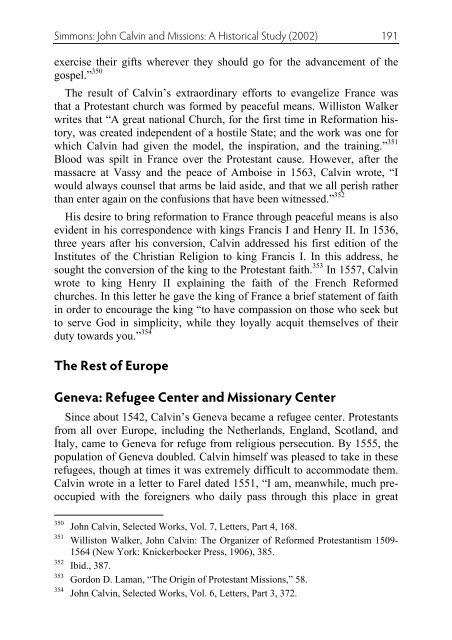Calvin and Missions - World Evangelical Alliance
Calvin and Missions - World Evangelical Alliance
Calvin and Missions - World Evangelical Alliance
You also want an ePaper? Increase the reach of your titles
YUMPU automatically turns print PDFs into web optimized ePapers that Google loves.
Simmons: John <strong>Calvin</strong> <strong>and</strong> <strong>Missions</strong>: A Historical Study (2002) 191<br />
exercise their gifts wherever they should go for the advancement of the<br />
gospel.” 350<br />
The result of <strong>Calvin</strong>’s extraordinary efforts to evangelize France was<br />
that a Protestant church was formed by peaceful means. Williston Walker<br />
writes that “A great national Church, for the first time in Reformation history,<br />
was created independent of a hostile State; <strong>and</strong> the work was one for<br />
which <strong>Calvin</strong> had given the model, the inspiration, <strong>and</strong> the training.” 351<br />
Blood was spilt in France over the Protestant cause. However, after the<br />
massacre at Vassy <strong>and</strong> the peace of Amboise in 1563, <strong>Calvin</strong> wrote, “I<br />
would always counsel that arms be laid aside, <strong>and</strong> that we all perish rather<br />
than enter again on the confusions that have been witnessed.” 352<br />
His desire to bring reformation to France through peaceful means is also<br />
evident in his correspondence with kings Francis I <strong>and</strong> Henry II. In 1536,<br />
three years after his conversion, <strong>Calvin</strong> addressed his first edition of the<br />
Institutes of the Christian Religion to king Francis I. In this address, he<br />
sought the conversion of the king to the Protestant faith. 353 In 1557, <strong>Calvin</strong><br />
wrote to king Henry II explaining the faith of the French Reformed<br />
churches. In this letter he gave the king of France a brief statement of faith<br />
in order to encourage the king “to have compassion on those who seek but<br />
to serve God in simplicity, while they loyally acquit themselves of their<br />
duty towards you.” 354<br />
The Rest of Europe<br />
Geneva: Refugee Center <strong>and</strong> Missionary Center<br />
Since about 1542, <strong>Calvin</strong>’s Geneva became a refugee center. Protestants<br />
from all over Europe, including the Netherl<strong>and</strong>s, Engl<strong>and</strong>, Scotl<strong>and</strong>, <strong>and</strong><br />
Italy, came to Geneva for refuge from religious persecution. By 1555, the<br />
population of Geneva doubled. <strong>Calvin</strong> himself was pleased to take in these<br />
refugees, though at times it was extremely difficult to accommodate them.<br />
<strong>Calvin</strong> wrote in a letter to Farel dated 1551, “I am, meanwhile, much preoccupied<br />
with the foreigners who daily pass through this place in great<br />
350<br />
John <strong>Calvin</strong>, Selected Works, Vol. 7, Letters, Part 4, 168.<br />
351<br />
Williston Walker, John <strong>Calvin</strong>: The Organizer of Reformed Protestantism 1509-<br />
1564 (New York: Knickerbocker Press, 1906), 385.<br />
352<br />
Ibid., 387.<br />
353<br />
Gordon D. Laman, “The Origin of Protestant <strong>Missions</strong>,” 58.<br />
354<br />
John <strong>Calvin</strong>, Selected Works, Vol. 6, Letters, Part 3, 372.

















